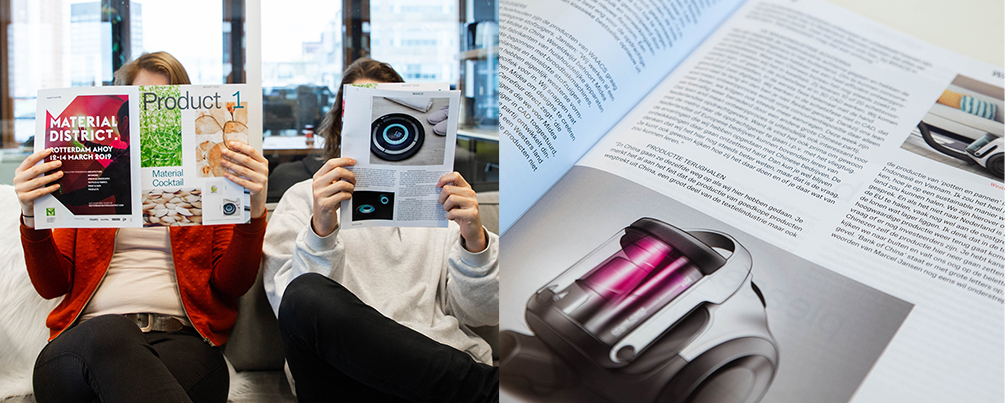
Last month our general manager, Marcel Jansen, was interviewed by Walter Wijnhoven, editor of Dutch design magazine: Product. Here he shared some of our success stories, our vision on production in China and the reason why we will never go fully digital.
STRONG ROOTS IN PRODUCT DESIGN
‘We are old skool industrial designers at heart’
Anyone who does not know the name WAACS will no doubt be familiar with various designs from this Rotterdam design agency. Over the years, WAACS has developed many innovative products including design classics such as the Senseo coffee maker. Also, the Friesland Campina milk cups, the Karvan Cévitam syrup canisters, cooking products for Boretti and ASKO and much, much more. Product magazine paid a visit to WAACS’ penthouse studio on the Coolsingel, directly opposite the Rotterdam City Hall.
“Refreshing ideas are translated into clever concepts and ultimately into a perfect and successful product, that is what we’re going for,” explains creative director Marcel Jansen. “We help our clients from around the world with smart and concrete, no-nonsense designs that are recognizable as typical WAACS designs. We are old skool industrial designers at heart and work mostly with physical products, of which the majority are consumer products. This is quite unique, because it is a very competitive market and nearly all product development has shifted to Asia. This makes it even more fun and exciting for us as a relatively small, Dutch agency.”
Medical products
An important product group for WAACS is medical/personal care. Jansen: “We design a lot of orthoses, external braces for the knee or wrist, for both preventive and post-operative purposes. Our biggest client in this field is Össur, an Icelandic company that has sponsor deals such as with the Icelandic football team. This means that we contributed to the success of the Icelandic national team, ha, ha.
We have a lot of experience in the medical world and in particular consumer-driven design is work that makes us proud. Companies in the medical field are much less agile, and that’s an area where we can really help them out. I believe there is still a lot of potential in better designs for medical equipment. We have already worked successfully on Medisana health and personal care products in Germany.”
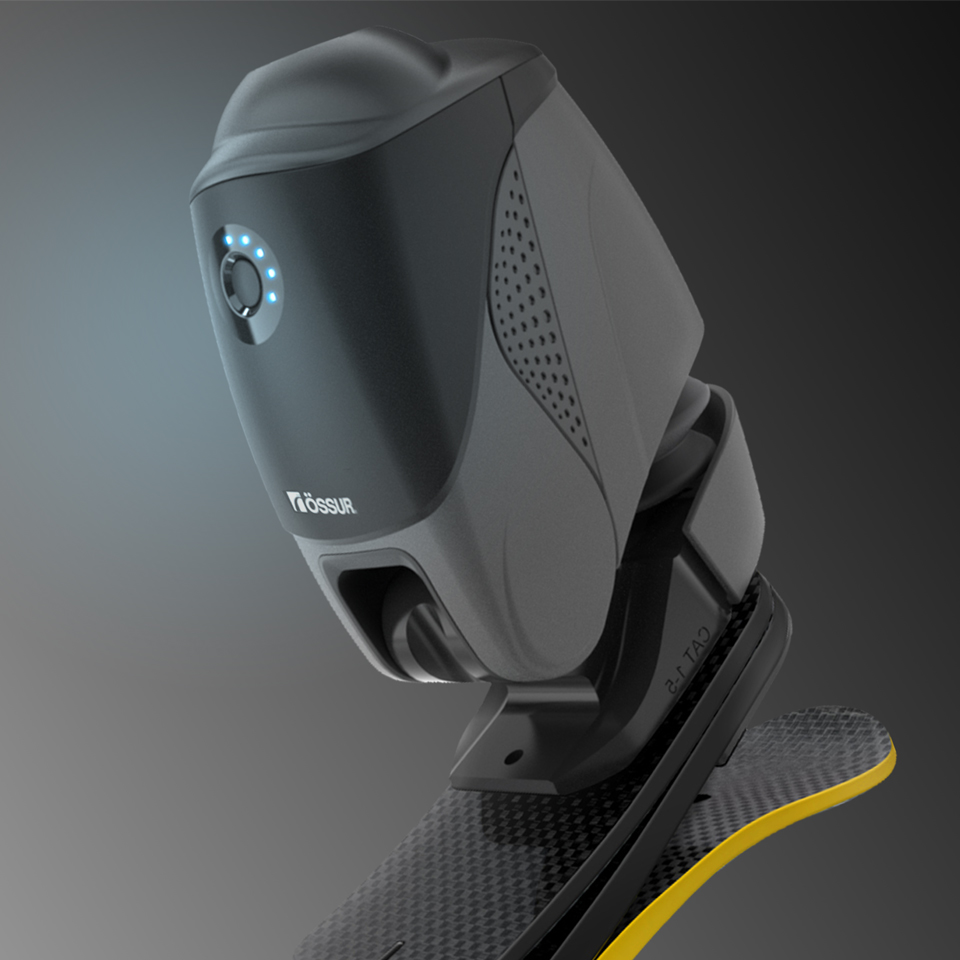
TargetScale
“The TargetScale for Medisana, designed by us, was recently relaunched. The client has a patent for a scale with light effects. Personally, I find it quite confronting when a scale gives an indication of your weight in grams. That was also my reason for suggesting a scale that indicates: ‘you’re on the right track’ or ‘there’s room for improvement’, without having to see your weight in grams. This laid the foundation for the TargetScale. Rings of light that come together as a ‘bullseye’: when only the outer ring lights up, it means that you’re losing sight of your target. The middle ring indicates that your weight is stable but without progression, and when the bullseye lights up it means you are getting close to your personal target. We consciously chose to design an object and not an appliance, which is why it is round and almost entirely black. We also want to introduce a white variant, which is more difficult in technical terms. The Bluetooth-enabled TargetScale communicates with your smartphone, but you don’t need to use the App because you don’t usually have your phone with you in the bathroom. We make managing your body weight fun and easy, instead of disappointing and frustrating.”
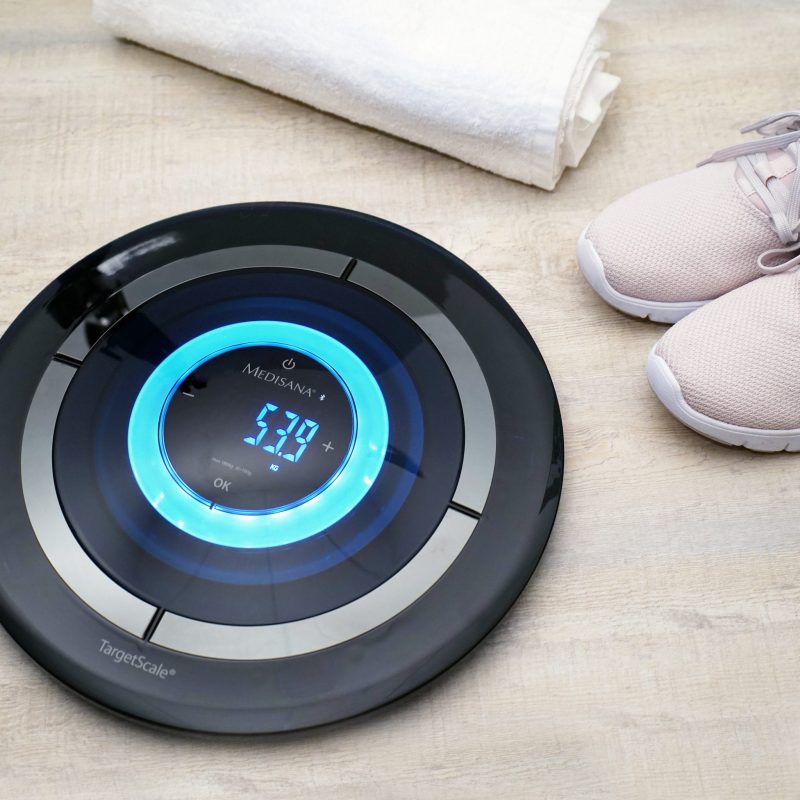
Digital
“Digital is also a necessary component for us and we also work with Apps, but there is no ambitionto go completely digital. We are and will always be industrial designers rooted in product design. However, a phone for example was once an appliance with physical buttons. A screen was added at one point, but it continued to be a physical product. Slowly but surely the buttons disappeared, and the small screen became so big that it has become the entire phone. It’s impressive that Jonathan Ive (Apples chief design officer) has turned a box into a beautiful box, but the whole user experience is contained within the screen. As industrial designer in this case, the only thing you can do is focus on the form of the box, but of course it’s all about the screen. So, we see that more and more of our products are made with screens. A nice example is the induction cooker plates we are currently working on. It is a large flat surface without physical buttons; pure user interface.”
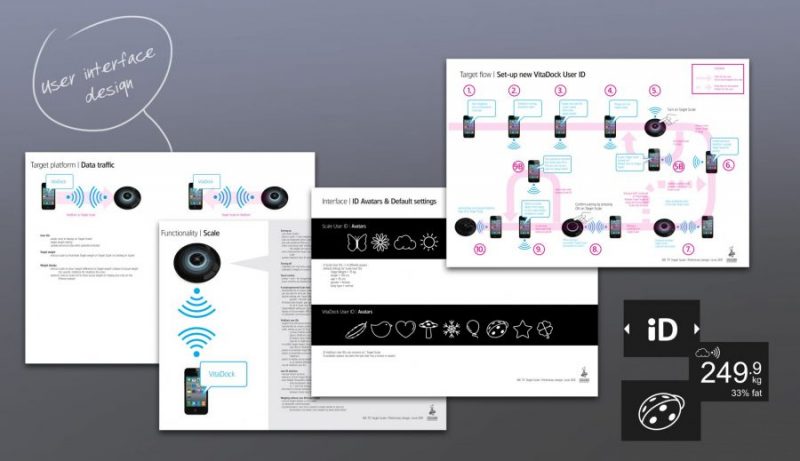
Persil
An additional important component of WAACS’ portfolio is packaging design, such as our work for global brand Henkel. “We are very proud of the Persil case, one of the biggest packaging cases you can do”, tells Jansen. “Worldwide, we have created a packaging platform that is ready for the future. Instead of designing a single form for the detergent bottle, we made a platform design that translates well to volumes varying from less than 1 liter to more than 5 liters. Since Henkel follows a multi-brand strategy, the design needed to be flexible enough to be suitable for its worldwide brand portfolio. Last but not least, we had to ensure that the platform would be resilient for the coming decades. There where strict ‘drop test’; to meet the requirements of shipping for e-commerce. The previous bottle couldn’t be shipped. By adding a second component to the cap and the spout with a technologically-advanced technique, a leak-proof system was created. We anticipated a development regarding breakage with a combination of design, material and processing characteristics that all came together in a new bottle design. It can be scary for a client to make changes to an already successful product, but we successfully reinvented a classic bestseller.”
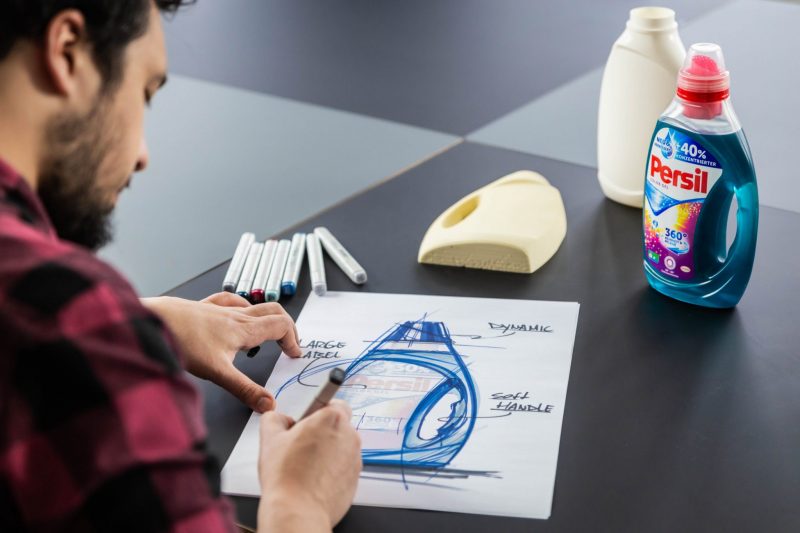
Vacuum cleaners
In the household, WAACS products are also popular, even in the category of vacuum cleaners. Jansen: “We have been working with Midea in China for a few years now. Midea is one of the top five largest manufacturers worldwide when it comes to domestic appliances. We began with bread makers, then microwave ovens, built-in appliances and finally vacuum cleaners.
Many Chinese companies actually need Western design and hire us here specifically for that purpose. We understand what Western buyers are looking for and help Midea to come up with designs that cause a buyer from, for example, Carrefour to immediately say: ‘I want that!’. For most of the vacuum cleaners we designed for Midea, they send us a CAD design for an existing vacuum cleaner that is already in their showroom. A Chinese party doesn’t develop products the same way as a Dutch party. The requirements in a Western country are stricter. The point here for me is that technical products don’t have to be developed and designed abroad. It often takes place right here in the Netherlands. People think that everything is designed somewhere far away, but it also happens here, at WAACS in Rotterdam. That’s something we’d like more people to know about.”
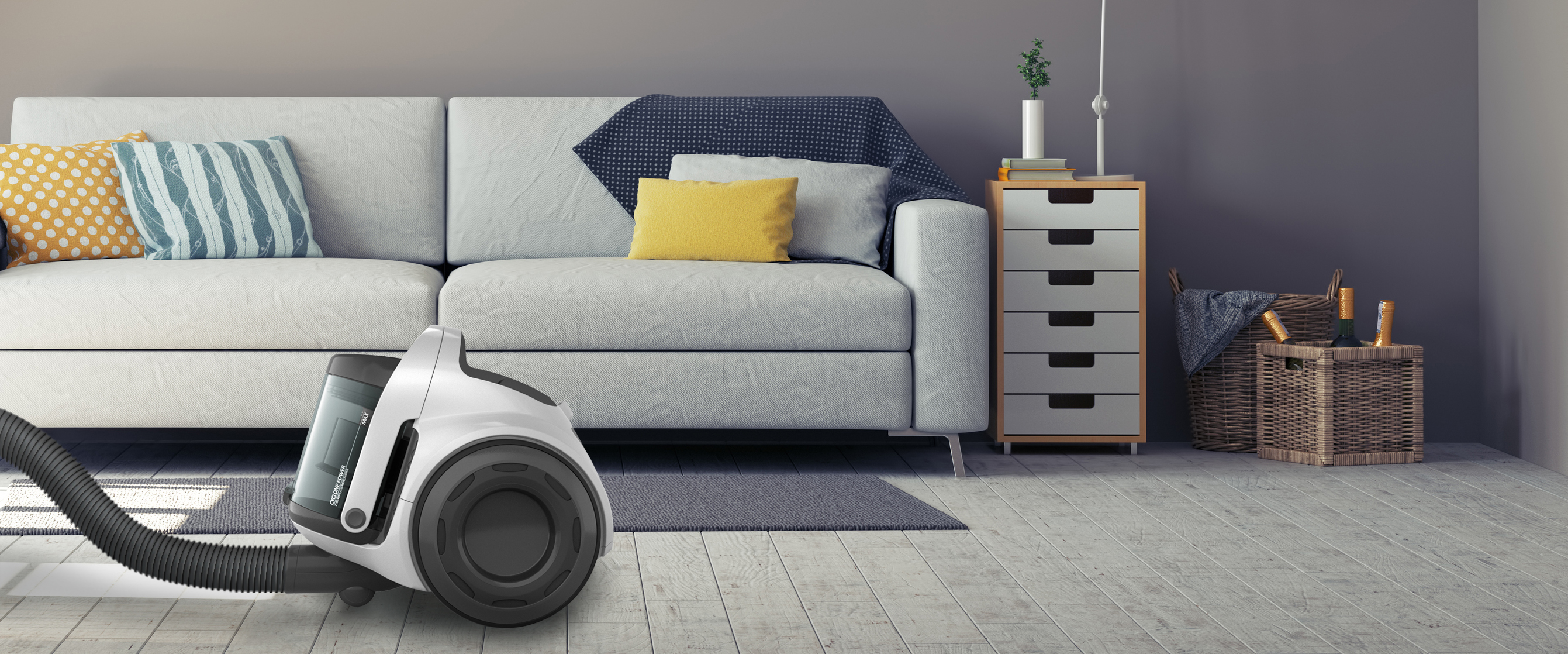
Chasing the manufacturing industry
“We have actually been chasing the manufacturing industry and the majority of our clients are abroad. In order to compete with Chinese agencies, we have come up with a very efficient design process. Where a Chinese agency is still focused on quantity, we zoom in on quality. They will provide 10 or 20 proposal sketches, or work in 3D CAD already in the sketch-phase. We produce 2 or 3 sketches at most, and in the first phase entirely done by hand (digitally). We don’t use CAD in the sketch phase because it takes up far too much time and you aren’t flexible enough. Thanks to our lean and mean design process, our competitive advantage has only increased, and we are receiving more and more requests. Coincidentally, we were contacted this week by another large Chinese company. Ultimately, our lean and mean design process is also interesting for Dutch clients. Because I also appreciate being able to go by metro instead of by plane to visit a client. After all, Dutch or European companies can learn from our experience of working with Chinese companies. Everything develops so quickly over there. We can continue thinking that we know better over here, but how can we be so sure? We can also choose to find out how they do things and if we can learn a few things.”
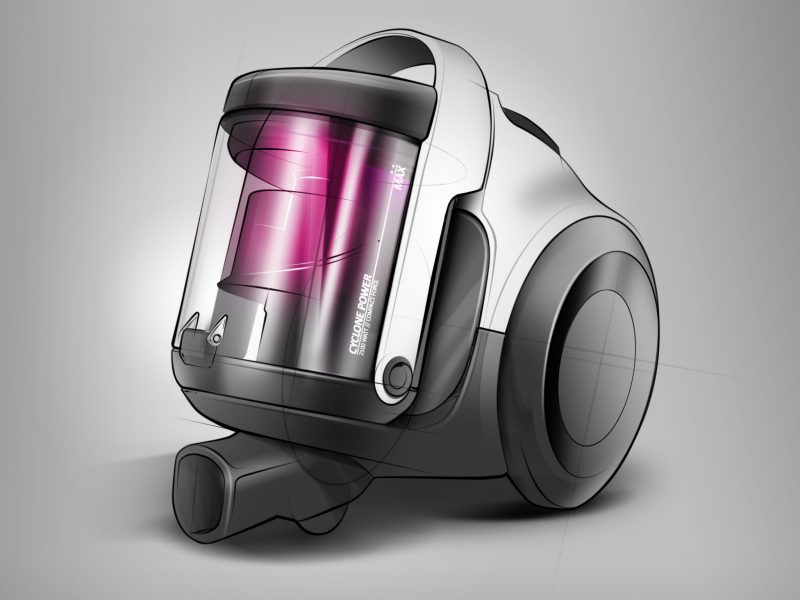
Production closer to home
“In China, they are following the same steps that we did here. You can already tell by the fact that fewer cheap products are being produced in China and that a large portion of the textile industry as well as the production of ‘pots and pans’ has already moved to countries like Indonesia and Vietnam. I would really like to join the discussion about finding a sustainable way to attract production to the Netherlands. We are already talking about this with our clients. And if the Netherlands isn’t possible, then we try for the EU, often ending up along the Eastern borders or in Portugal where the wages are somewhat lower. I believe that smart and high-quality production will make a comeback. However, the question remains whether there will still be investors around when it does. There is a possibility that the Chinese will move their own production over here.” At this moment, we look out the window and notice the signing on the building opposite: ‘Bank of China’ in large letters, as if to emphasize the words of Marcel Jansen.
Interview: Walter Wijnhoven, Product magazine
Translation: Chloé Brown, Very Good Words
Image: WAACS, Össur , Medisana Gmbh
